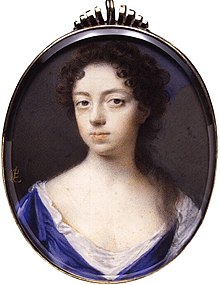Anne Finch, Countess of Winchilsea
British countess and poet (1661-1720)
Anne Finch, Countess of Winchilsea (née Kingsmill; April 1661 – 5 August 1720) was an English poet and courtier. Finch wrote in many genres and on many topics, including fables, odes, songs, and religious verse. Her works also allude to other female authors of the time, such as Aphra Behn and Katherine Philips. Through her commentary on the mental and spiritual equality of the sexes and the importance of women fulfilling their potential as a moral duty to themselves and to society, she is regarded as one of the integral female poets of the Augustan Era. Finch died in Westminster in 1720 and was buried at her home at Eastwell, Kent.

Quotes
edit- This to the crown and blessing of my life,
The much lov’d husband of a happy wife;
To him whose constant passion found the art
To win a stubborn and ungratefull heart,
And to the world by tend’rest proof discovers,
They err, who say that husbands can’t be lovers.- "A Letter to Daphnis" (2 April 1685)
- Judge not my passion by my want of skill:
Many love well, though they express it ill;
And I your censure cou’d with pleasure bear,
Wou’d you but soon returne, and speake it here.
- Did I my lines intend for publick view,
How many censures wou’d their faults persue; ...
True judges might condemn their want of witt,
And all might say, they’re by a Woman writt.- "The Introduction" (1713)
- Alas! a woman that attempts the pen,
Such an intruder on the rights of men,
Such a presumptuous Creature, is esteem’d,
The fault, can by no vertue be redeem’d.- "The Introduction" (1713)
- They tell us we mistake our sex and way;
Good breeding, fassion, dancing, dressing, play
Are the accomplishments we shou’d desire;
To write, or read, or think, or to enquire
Wou’d cloud our beauty and exaust our time,
And interrupt the Conquests of our prime;
Whilst the dull mannage of a servile house
Is held by some our outmost art and use.- "The Introduction" (1713)
- How are we fal’n, fal’n by mistaken rules,
And Education’s more than Nature’s fools.- "The Introduction" (1713)
- The King, the Priest, the Prophet, all are Thine,
Nor wou’d ev’n God (in Flesh) thy Stroke decline.- "To Death" (1713)
- Cou’d our First Father, at his toilsome Plough,
Thorns in his Path, and Labour on his Brow,
Cloath’d only in a rude, unpolish’d Skin,
Cou’d he a vain Fantastick Nymph have seen,
In all her Airs, in all her antick Graces,
Her various Fashions, and more various Faces;
How had it pos’d that Skill, which late assign’d
Just Appellations to Each several Kind!
A right idea of the Sight to frame;
T’have guest from what New Element she came;
T’have hit the wav’ring Form, and giv’n this Thing a Name.- "Adam Pos'd" (1713)
- Love, thou art best of Human Joys,
Our chiefest Happiness below;
All other Pleasures are but Toys,
Musick without Thee is but Noise,
And Beauty but an empty show.Heav’n, who knew best what Man wou’d move,
And raise his Thoughts above the Brute;
Said, Let him Be, and Let him Love;
That must alone his Soul improve,
Howe’er Philosophers dispute.- "A Song" (1713)
- Free as Nature’s first intention
Was to make us, I’ll be found,
Nor by subtle Man’s invention
Yeild to be in Fetters bound
By one that walks a freer round.Mariage does but slightly tye Men
Whil’st close Pris’ners we remain,
They the larger Slaves of Hymen
Still are begging Love again
At the full length of all their chain.- "The Unequal Fetters" (1713)
External links
edit- Miscellany Poems, on Several Occasions (London, 1713)